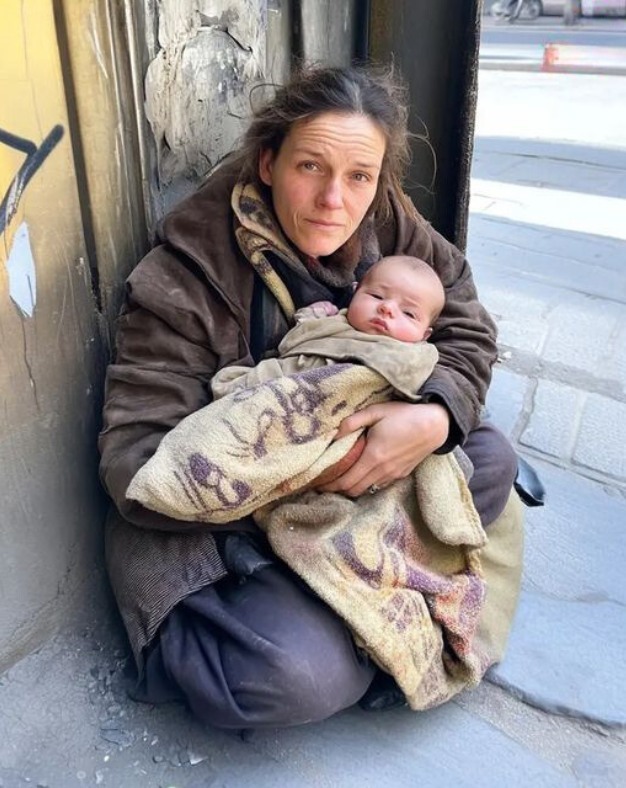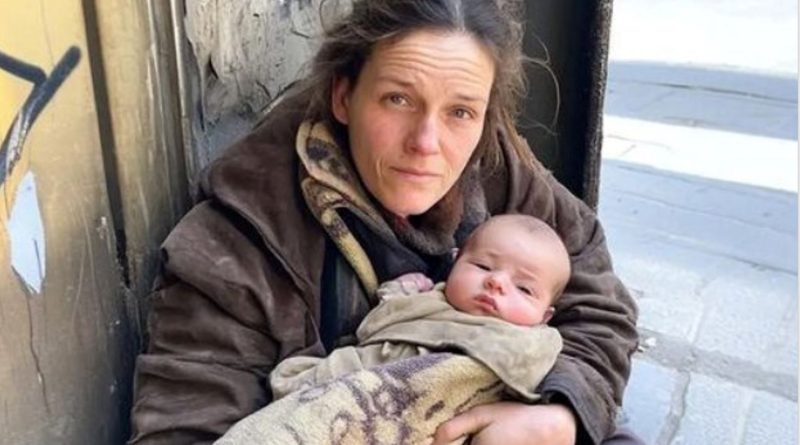I Took in a Beggar with a Baby Because She Reminded Me of
At 75, I had grown accustomed to the quiet of my days. The passing of time had left me in a house that felt far too big and much too empty, filled only with memories of a life that had once been bustling with love and family. My daughter, Gianna, had passed away three years ago, and the weight of that loss still sat heavy on my heart. Every corner of the house reminded me of her, of the vibrant life that had been taken too soon.
My son, Sebastian, lived far away. He had his own life, a busy one, filled with work and a family of his own. I couldn’t blame him for the infrequency of his visits, though I missed him terribly. I understood how life could pull people in different directions, even if it meant we rarely saw one another. His calls, though sporadic, were always welcome, but they never quite filled the void left by the absence of my daughter.
I kept myself busy in small ways—shopping for groceries, attending weekly book club meetings, and exchanging pleasantries with neighbors. But underneath the routine was an aching loneliness that I had learned to mask with a polite smile.
One ordinary afternoon, while coming back from the grocery store, I saw her. A young woman, sitting by the roadside, cradling a small baby wrapped in a worn blanket. There was something about the way she held the baby, so protectively, that tugged at my heart. She reminded me of Gianna, in a way—vulnerable but strong. Her face was hidden, but her posture told a story of exhaustion and desperation. I felt a pull to approach her, a feeling I couldn’t ignore.

“Do you need help, dear?” I asked gently, not wanting to startle her. When she looked up, her eyes, filled with sorrow and exhaustion, met mine.
“I don’t want to be a burden,” she whispered, her voice trembling, as though she had grown used to rejection.
“Nonsense,” I replied, offering her a soft smile. “You and your baby need a warm place to rest. Come with me.”
She hesitated for a moment, her grip tightening around the baby, before nodding slowly. “Thank you,” she whispered, her voice barely audible.
We walked back to my home in silence. The baby, a tiny boy, stirred in her arms, and she instinctively held him closer. As I led her inside, offering her a seat on the couch, the house felt different—warmer, alive. It had been so long since it felt like this.
I warmed some tea and handed her a cup. “What’s your name?” I asked as I sat beside her.
“Julia,” she said softly, still cradling her baby. “And this is Adam.”
I smiled at the baby, who blinked up at me with wide, curious eyes. “He’s a handsome boy,” I said, trying to ease the tension in the room.
Julia gave a small, tired smile. “Thank you. He’s all I have.”
In the days that followed, Julia and Adam stayed with me. She found a job at a nearby grocery store, and I took care of Adam while she worked. The house, once quiet and somber, was now filled with the sound of Adam’s little giggles and the pitter-patter of his feet. His laughter brought a joy I hadn’t felt in years, and for the first time in a long while, I didn’t dread the long hours of the day.
“Thank you for everything you’ve done for us,” Julia said one evening after putting Adam to bed. We sat at the kitchen table, cups of tea in our hands.
“It’s been good for me too,” I admitted. “The house was too quiet before you came.”
She looked at me with eyes full of gratitude. “I don’t know what we would’ve done without you.”
As weeks turned into months, our bond grew stronger. Julia told me bits and pieces of her life, though she was guarded about certain details. I learned that she had another child, a five-year-old daughter named Aurora, who was staying at a charity hospital.
“She’s not well,” Julia explained one evening, her voice barely above a whisper. “But I don’t talk about it much.” There was a deep sadness in her eyes whenever she spoke of Aurora, and though I longed to know more, I didn’t push. I knew she would open up when she was ready.
Then one afternoon, everything changed.
I returned home from my book club earlier than usual. The house was quiet—too quiet. Adam was with me, and Julia was supposed to be at work, so I thought nothing of it at first. But as I stepped into my bedroom, I froze.
There, standing by my dresser, was Julia, rifling through my drawers. My jewelry, loose bills, and even my mother’s old brooch were scattered on the floor. My heart sank.
“Julia?” I gasped, the shock evident in my voice.
She spun around, her face pale with guilt. Tears welled up in her eyes as she dropped everything she had been holding. “I can explain,” she stammered, her voice shaking.
“Why?” I whispered, struggling to understand what I was seeing.
“I didn’t mean to steal,” Julia cried, her hands trembling. “Aurora needs surgery, and I don’t have the money. I was desperate.”
Her words hung in the air, and despite my anger, I felt a surge of sympathy. I had lost a child once. I knew what it felt like to be willing to do anything to protect someone you love. How could I blame her for that?
I knelt beside her, placing a hand on her shoulder. “You should have told me,” I said softly. “We could have found a way together.”
Julia broke down, sobbing into my shoulder. “I didn’t want to ask for more. You’ve already done so much.”
“We’ll figure this out,” I whispered, hugging her tightly. “You’re not alone.”
The next morning, I woke up determined to help. Julia didn’t just need a place to stay—she needed a community, and Aurora needed that surgery. I called my old friends, neighbors, and former students. Together, we organized a fundraiser for Aurora, rallying the town behind Julia’s cause.
The day of the fundraiser was incredible. People came from all over to donate, participate in auctions, and buy baked goods. We raised more than enough for Aurora’s surgery, and the outpouring of support brought tears to Julia’s eyes.
Aurora’s surgery was a success. When the doctor finally gave us the news, Julia collapsed into my arms, overcome with relief. “Thank you,” she whispered through her tears. “You saved her.”
“You’ve given me something too,” I said, brushing her hair back. “You brought life back into my home.”
After the surgery, Julia and her children moved back in with me. The house was no longer empty—it was full of love, laughter, and the sounds of a new family. And in those moments, I realized that sometimes, family isn’t who you’re born with; it’s who you choose. Julia, Adam, and Aurora weren’t just guests—they had become my family.
